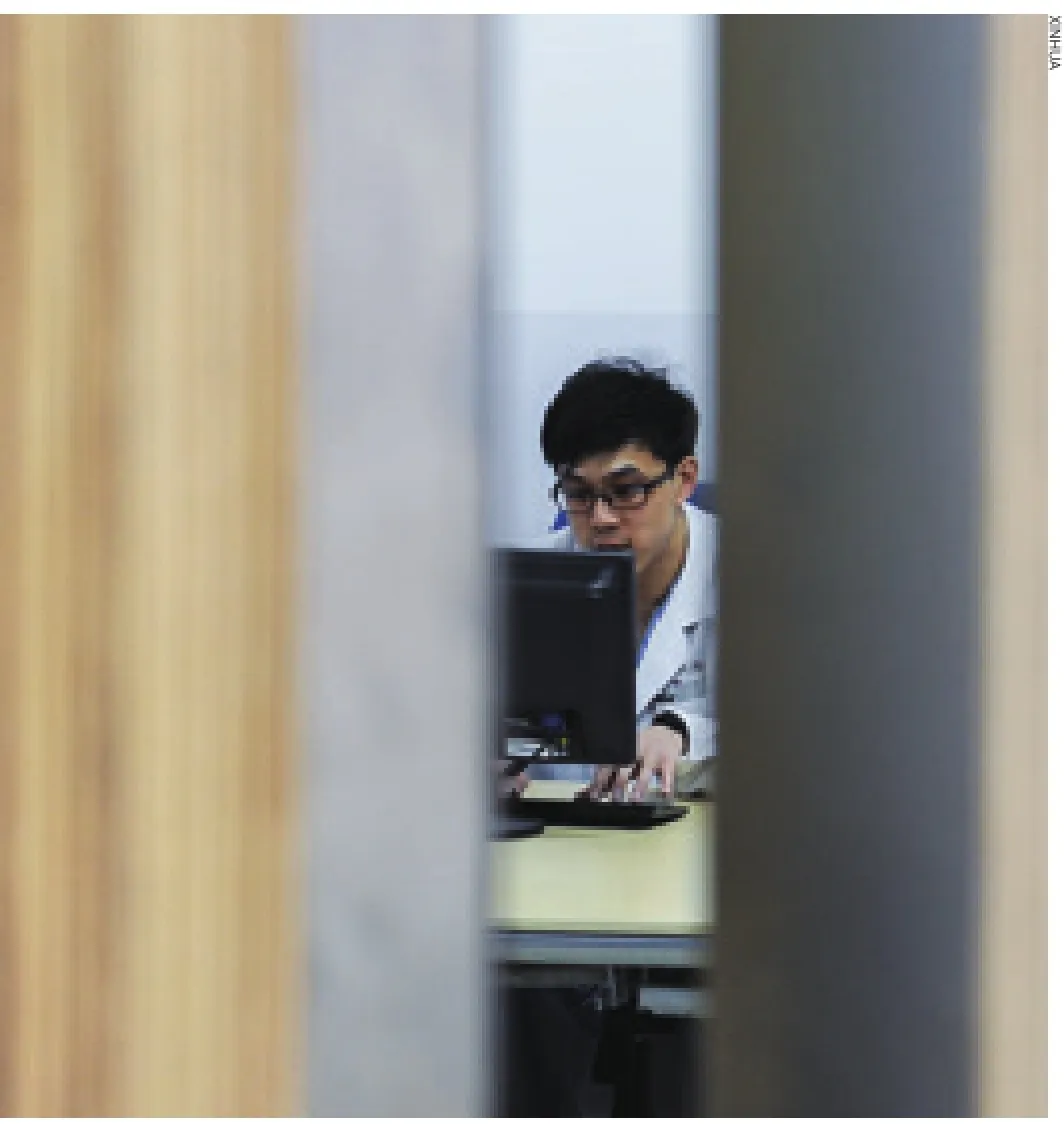White Collar Dilemma
2016-09-26JiJing
CULTURE
White Collar Dilemma
Will new pledges to protect office worker rights make a difference?By Ji Jing
Li Meiling, who works at a privatesector public relations company in Beijing, has to work until 8-9 p.m. and also at weekends for half the year. Things were much worse at her previous company, where she had to work until 1-2 a.m. and return to work around 10 a.m. the next day for four to five consecutive months. Li told Beijing Review she had suffered health problems as a result.
Li is far from alone, as overwork has become commonplace among white-collar workers in first-tier cities. Many white-collar workers feel under pressure at work, partly because they often have to work overtime and have no opportunities for physical exercise.
Overtime frequently goes unpaid, and being unable to take paid leave is not unknown. Small wonder then that white-collar workers were listed among priority groups calling for special attention in Beijing’s employee development plan unveiled in August.

ZHANG JIANHUI
Exhaustion
A song entitled So Far, the Sofa Is So Far,recently created by composer and songwriter Jin Chengzhi and performed by his Shanghai-based choir, the Rainbow ChamberSingers, aptly captures the lifestyle of white-collar workers.
“I have kept my makeup on for 18 days and worn my contact lenses for two and a half years. I suffer endocrine disorders and have become increasingly obese,” the lyrics go.
Within just five hours of its release on July 27, the song had been played over 3 million times through various online streaming sites.
The song’s lyrics have struck a chord with whitecollar workers in cities such as Beijing and Shanghai. Jin said that although the song’s protagonist lives in the capital, the song actually reflects young people’s lives in general in China’s top-tier cities.
Overworking may even have caused premature deaths. For instance, Jin Bo, an editor with China’s leading online forum, Tianya, died of a heart attack in June at the age of 34. According to his colleagues, Jin often worked late into the night.
A report on the quality of working life of white-collar workers published in August last year by Zhaopin. com, a leading Chinese job portal, showed that white-collar workers experience significant pressure at work—over half do no exercise during the workday, and one third work more than five extra hours each week. Only 20 percent of the 13,400 people surveyed reported feeling satisfied with their work environment.
Those working in the information technology, telecommunications, electronics and Internet industries registered the most overtime: 9.3 hours per week on average.
In addition to overtime, a long commute is also common in cities such as Beijing and Shanghai.
Li purchased an apartment at the beginning of this year in Yanjiao, a small town in Hebei Province adjacent to Beijing. She spends around 1 hour traveling between home and work, a distance of around 30 km.
According to a report published by Beijing Normal University, Beijing has China’s longest average two-way commute—97 minutes per day. Commuting in the first-tier cities of Shanghai, Guangzhou and Shenzhen also takes a long time—around 90 minutes on average—due primarily to the long distance and traffic congestion.
Zhang Xiang, who works for an Internet company in Beijing, said he spends a lot of time commuting. Zhang lives near the northwest Fifth Ring Road but works in the city center, and he has to take four subway lines to get to his office.
“I often work overtime, and all I think about while on the subway is computer programs. I go to bed immediately after getting home and have no time to watch TV, let alone find a girlfriend,” said Zhang.

A doctor in Harbin, northeast China’s Heilongjiang Province, works on the night shift on April 30
Protection
Beijing’s decision to prioritize white-collar worker protection has thrust the working conditions of office workers into the spotlight. According to its guideline on employee development during the period of China’s 13th Five-Year Plan (2016-20), white-collar workers will, for the first time, receive special attention along with technical, female, role model and migrant workers.
The document, jointly issued by the Beijing Municipal Federation of Trade Unions and the Beijing Municipal Commission of Development and Reform,pledges to ensure decent work for all by protecting a number of key rights,such as the rights to get paid, work in a safe environment and be covered by social security.
White-collar workers are often misconstrued as enjoying good working conditions. Occupational disease prevention and control efforts tend to focus on blue-collar workers. Blue-collar workers are also allowed to retire earlier than white-collar counterparts.
“Damage done to blue-collar workers’ health is more obvious,such as pneumoconiosis and sunstroke. However, the causes of white-collar workers’ health problems, which include obesity and cervical spondylosis, are hard to identify. They may have been caused by work, but also may have been caused by personal habits,”wrote commentator Luo Zhihua in China Women’s News.
“In recent years, the rates of obesity, high blood pressure,diabetes and gastric cancer have increased among white-collar workers owing to long work hours,high pressure, lack of exercise and irregular diet. In the meantime, the rates of mental illness such as depression are also on the rise. It’s time, therefore, to pay attention to and protect white-collar workers’ health,” said Luo.
Pan Jianxin, Vice Chairman of the Beijing Municipal Federation of Trade Unions, said trade unions at all levels in Beijing will care more about white-collar workers’ health, prevent overworking and sub-par health, and monitor, prevent and control the impact of electromagnetic radiation and chemical pollutants in offices.
“In addition, trade unions will encourage white-collar workers to do more exercise and take regular health checkups. Three hundred psychological counseling centers will be established within five years to help white-collars deal with their psychological problems,” said Pan.
Li, however, feels pessimistic about the effectiveness of the guideline, as she believes it will be hard to implement. “There were times when my rights were violated at work, but I had to accept it if I wanted to stay in the company,” she said. ■
